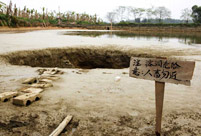

Chinese shop overseas due to quality scandals
The central government on Wednesday announced a plan to improve the quality of China-made products, in an apparent bid to enhance international competitiveness and boost consumer confidence in domestic goods.
Issued by the State Council, China's cabinet, the plan listed specific consumer goods such as air filters, rice cookers and electronic toilet seats, which Chinese go overseas to purchase, and has sparked a debate on the quality of China-made goods.
The government will take special measures to improve consumer goods, particularly those Chinese demand the most, including smartphones, toys, children's clothes and furniture, the State Council said in the plan published on its website.
The move drew mixed reactions online, with some mocking the State Council for being too specific, and others saying the government has finally responded to their concerns over the quality of domestic products.
Experts said the public response is understandable, as China faces pressure to improve the quality of domestic goods to meet rising standards.
Although the general manufacturing capability of Chinese companies has been growing steadily in recent years, the lack of confidence in Chinese products' quality, punctuated by scandals, has compelled Chinese citizens to shop in countries such as Japan, the US and in Europe.
"The government should not list specific items, and instead focus on macro policies to encourage the manufacturing sector to upgrade and transform," said Yang Danhui, a research fellow at the Institute of Industrial Economics of the Chinese Academy of Social Sciences (CASS).
For the government to be involved too much in the process could have unintended consequences, such as limiting creativity and innovation, Yang told the Global Times on Wednesday. She said the government should leave enough room for companies to innovate.
"And there is enough pressure and motivation for companies to produce high-quality products because Chinese consumers' standards are rising," Yang added.
Pressure to improve quality and protect consumer rights also comes from the growing access to foreign alternatives, according to Xu Hongcai, director of the Economic Research Department under the China Center for International Economic Exchanges.
"Under such an open environment, if Chinese consumers are not satisfied with domestic goods, they can go the US or Japan to buy them," Xu told the Global Times on Wednesday.
Billions spent abroad
The number of Chinese who travel overseas has rapidly been rising along with the amount of money they spend. In 2015, the Chinese spent $215 billion outside the mainland, or a 53 percent increase from the previous year, according to data from the World Travel &Tourism Council.
Luxury goods, cosmetics and infant formula are among the products most sought after by Chinese who travel overseas, according to media reports. And in Japan, electronic toilet seats, which can spray wash, blow dry and massage, and rice cookers attract many Chinese visitors.
The trend sparked an online debate about domestic product quality and the rising standards of some consumers. It even drew the attention of Premier Li Keqiang, who commented on the trend in a press briefing last April, saying "consumers have the right to more options and we have an open attitude about it, and this will also pressure us to upgrade our industries," chinanews.com reported at the time.
Soon after Li's remarks, in May, the State Council unveiled the "Made in China 2015" plan, which aimed to upgrade and transform the country's manufacturing sector and improve the quality of China-made goods.
Wednesday's plan is part of long-term efforts to make China's manufacturing industry more competitive, said Xu, adding under a persistent slowdown in the country's economy, such a move is necessary to boost demand.
The real problem is poor regulation and low quality standards, Xu added. "So what we need is robust measures, including ousting inefficient factories and protecting intellectual property, to create a favorable environment for innovation."
 The evolution of J-10 fighter
The evolution of J-10 fighter Top 10 Asian beauties in 2016
Top 10 Asian beauties in 2016 What's happening in Xisha Islands?
What's happening in Xisha Islands? When female soldiers meet flowers
When female soldiers meet flowers North Sea Fleet conducts drill in West Pacific Ocean
North Sea Fleet conducts drill in West Pacific Ocean Old photos record the change of Sichuan over a century
Old photos record the change of Sichuan over a century Breathtaking aerial photos of tulip blossoms in C China
Breathtaking aerial photos of tulip blossoms in C China Horrific: Pit swallows 25 tons of fish overnight
Horrific: Pit swallows 25 tons of fish overnight Vietnamese Su-30 fighters fly over Nanwei Island in South China Sea
Vietnamese Su-30 fighters fly over Nanwei Island in South China Sea Top 20 hottest women in the world in 2014
Top 20 hottest women in the world in 2014 Top 10 hardest languages to learn
Top 10 hardest languages to learn 10 Chinese female stars with most beautiful faces
10 Chinese female stars with most beautiful faces China’s Top 10 Unique Bridges, Highways and Roads
China’s Top 10 Unique Bridges, Highways and Roads When can a fan call it quits
When can a fan call it quits Expats aim for the silver screen
Expats aim for the silver screen Press freedom index hides absurd logic
Press freedom index hides absurd logic Toxic campus scandal tests govt ability to build public trust
Toxic campus scandal tests govt ability to build public trustDay|Week